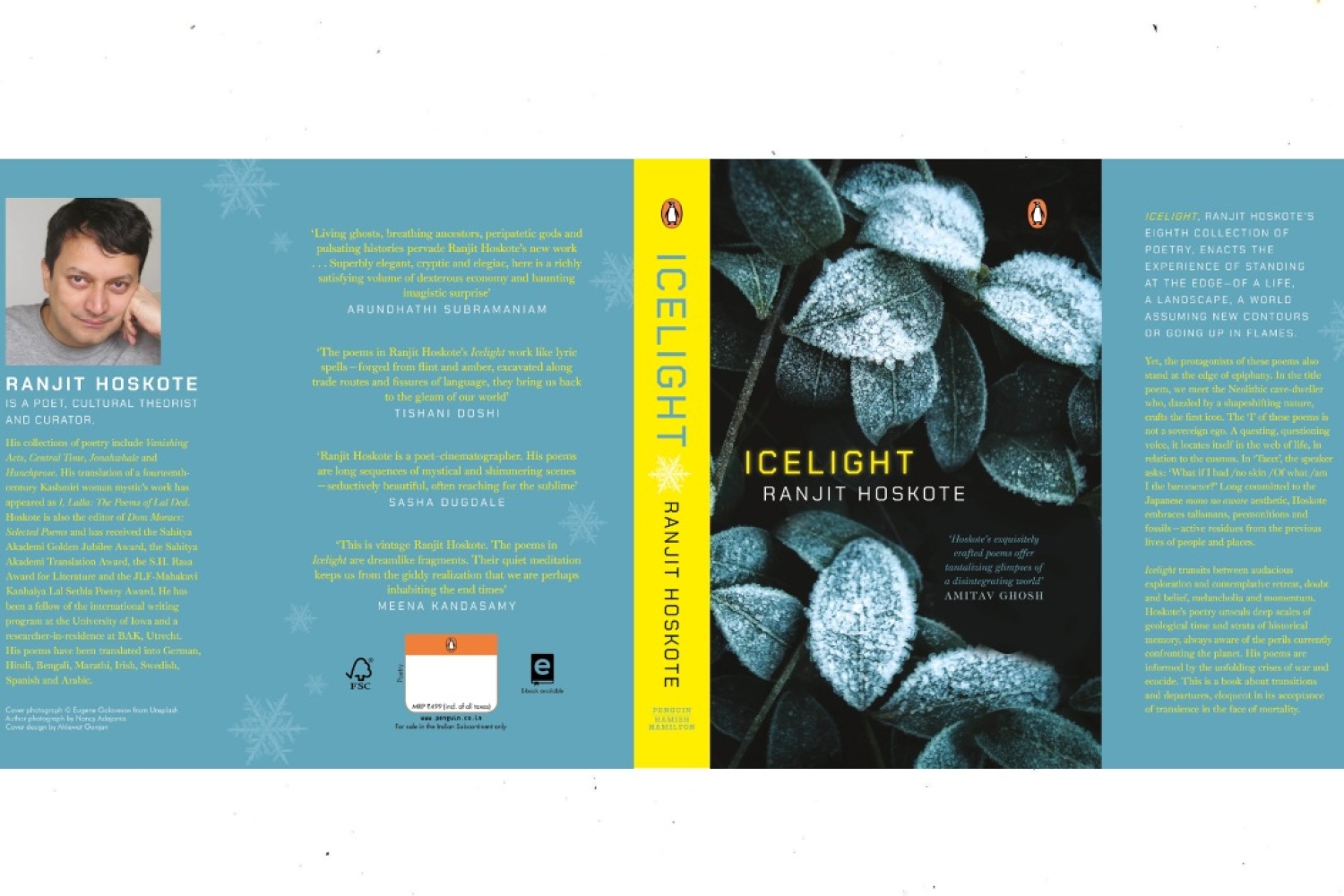

“Icelight explores continuities we have lost — continuities signalled by tree patterns, bird paths and seasonal cycles from which we’ve become alienated or which have been damaged and distorted by irresponsible human interfer- ence in the planetary rhythms. Also, Icelight opens up a cabinet of memories: some going back to childhood expe-riences of balancing at the edge, others embracing generations of family lore, yet others emerging from ancestral diasporas. Icelight traces the passage of time as a passage of memories and techniques of vision and making, from one generation to another,” reveals acclaimed poet Ranjit Hoskote of his new poetry collection. Icelight is a visceral journey through poesy into the deep crevices of our world, replete with crises, yet brimming with epiphanies. “I hope that readers of Icelight will take away from this book a prayerful sense of resurgent hope, a commitment to letting light return through the gathering darkness,” echoes the poet of his intentions. We delved further into the book’s creation with him below:
What inspired the creation of Icelight?
Poems often begin, for me, in sensorially compelling experiences that resist language. One such starting point for Icelight is the experience of looking up at the mysterious light of white clouds passing overhead in the night. That light emerged long before the advent of humankind, and will continue long after we have become an extinct species. That light took possession of me, as a sign of mortality as well as eternity — a reminder that the natural world is not there to be owned by us, it is infinitely vaster than our efforts to assert ourselves.
Another starting point for me, for Icelight, is the everyday knowledge of living in a coastal metropolis, Mumbai, which is almost certainly doomed to suffer submergence prompted by the global sea-level rise within my lifetime. And to have to suffer, on every side, large-scale infrastructure projects that planners have inflicted on us — the coastal highways, the metro and monorail systems — serenely untroubled by the ecological apocalypse that is on its way.
Could you share with us further, what the creation of the book entailed?
In writing Icelight, I have been deeply aware of certain key questions, as we transit into a very precarious future. As vulnerable actors in a broken world, damaged by ourselves, how do we re-calibrate our lives, how do we articulate our love and compassion even in the most difficult circumstances? How do we bear witness to our own deep flaws as individuals and as a species, spreading toxicity even as we hope fervently to transform our societies and environments for the better? How can we imagine a future based on equity and mutuality and healing, when some of us think that the best solution to managing our ship- wrecked planet is either to polarize turbulent societies yet further and yet more violently, or to escape to other planets, presumably to exploit and destroy them in the same way, armed with the same extractivist mentality? Icelight is, in one of its dimensions, a protest against such failures of the social and political imagination.
My creative process has been sustained by the urgent discussions around these subjects among colleagues with whom I work — among them, ecologists, environmental historians, scientists, ecological activists, and anthropologists. At the same time, I have been attuned to key, focal images that come up to me from the depths of my imagination, and which embody our current predicament – such as the woman who wonders how she can record the unpredictable pressures of a universe that speaks in riddles and dilemmas; or the last fisherman, who offers himself as sacrifice to a nature turned monstrous; or the hazmat-suited kamikaze worker trying to sanitize a poisoned city; or the prophet poised on a cliff, looking at a promised land he will never reach.
What stands at the core of this collection?
Icelight has drawn on my immersion in ecological concerns during the last few years, even as I have been revisiting my memories of my sylvan childhood in 1970s Goa, an IndoIberian society still untouched by runaway urbanisation, a sylvan environment unscarred by rampant growth. I’ve been dwelling on the fate of the North and South Pole as well as the Himalayas, which are regarded by ecologists as the ‘Third Pole’, and how literal meltdowns in these zones will set off alarming catastrophes and have dire conse- quences in other regions.
I continue to be deeply moved by the tragic heroism, the stoicism and the sheer brokenness that attend the forced migrations taking place across our planet, both among humans and animals. The personal and collectively shared experience of solastalgia, sorrow in the face of dramatic and often irreversible changes in locales one has known, lies at the heart of Icelight.
Could you also acquaint us to any challenges?
The great, perennial, and productive challenge that all poets must face: how to craft a language that has renovated itself through experiment and mystery, and yet invites its readers to savour surprises and epiphanies.
Lastly, what are you working on next?
I am completing work on my translation of a selection of poems by the great Urdu poet Mir Taqi Mir, who lived during the late eighteenth century and into the first decade of the nineteenth — Mir’s is a voice that remains superbly contemporary in its sense of epic unease and exilic melancholia, its awareness of the brittleness of our hopes and desires, and yet, its robust insistence on singing songs against the darkness. Penguin will publish this translation, in early 2024.
This is an all exclusive from our July EZ. To read more such articles, follow the link here.
Words Nidhi Verma
Date 03-07-2023